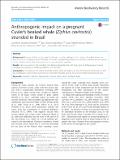Files in this item
Anthropogenic impact on a pregnant Cuvier's beaked whale (Ziphius cavirostris) stranded in Brazil
Item metadata
| dc.contributor.author | Bortolotto, Guilherme A. | |
| dc.contributor.author | Morais, Igor Oliveira Braga | |
| dc.contributor.author | Ferreira, Paulo Roberto Bahiano | |
| dc.contributor.author | Reis, Maria do Socorro Santos dos | |
| dc.contributor.author | Souto, Luciano Raimundo Alardo | |
| dc.date.accessioned | 2019-10-15T09:30:03Z | |
| dc.date.available | 2019-10-15T09:30:03Z | |
| dc.date.issued | 2016-06-13 | |
| dc.identifier | 261541603 | |
| dc.identifier | 14527fee-fe62-4d07-9c8e-f60aaf3cb7f7 | |
| dc.identifier | 84979992995 | |
| dc.identifier.citation | Bortolotto , G A , Morais , I O B , Ferreira , P R B , Reis , M D S S D & Souto , L R A 2016 , ' Anthropogenic impact on a pregnant Cuvier's beaked whale ( Ziphius cavirostris ) stranded in Brazil ' , Marine Biodiversity Records , vol. 9 , 30 , pp. 1-5 . https://doi.org/10.1186/s41200-016-0055-0 | en |
| dc.identifier.other | ORCID: /0000-0002-5343-6575/work/63045999 | |
| dc.identifier.uri | https://hdl.handle.net/10023/18670 | |
| dc.description.abstract | Background: Because of their usually cryptic behaviour, most knowledge on the biology of beaked whales are from records of stranded animals. Although the Cuvier’s beaked whale (Ziphius cavirostris) is the best known species of the ziphiidae family, little information on its reproduction is available. Results: Here we report on the stranding of a dead pregnant female with clear signs of anthropogenic impact, including the presence of a fishing artefact in the stomach. Conclusions: The region of the stranding (north-eastern coast of Brazil) is an area of increasing interest for oil and gas exploitation. Conservation concerns may arise from findings such as the one presented and discussed here. | |
| dc.format.extent | 5 | |
| dc.format.extent | 2445127 | |
| dc.language.iso | eng | |
| dc.relation.ispartof | Marine Biodiversity Records | en |
| dc.subject | Ziphiidae | en |
| dc.subject | Cetacean | en |
| dc.subject | Reproduction | en |
| dc.subject | Marine debris | en |
| dc.subject | Brazil | en |
| dc.subject | Toothed whale | en |
| dc.subject | GC Oceanography | en |
| dc.subject | QH301 Biology | en |
| dc.subject | DAS | en |
| dc.subject | SDG 14 - Life Below Water | en |
| dc.subject.lcc | GC | en |
| dc.subject.lcc | QH301 | en |
| dc.title | Anthropogenic impact on a pregnant Cuvier's beaked whale (Ziphius cavirostris) stranded in Brazil | en |
| dc.type | Journal article | en |
| dc.contributor.institution | University of St Andrews. School of Biology | en |
| dc.identifier.doi | https://doi.org/10.1186/s41200-016-0055-0 | |
| dc.description.status | Peer reviewed | en |
This item appears in the following Collection(s)
Items in the St Andrews Research Repository are protected by copyright, with all rights reserved, unless otherwise indicated.

